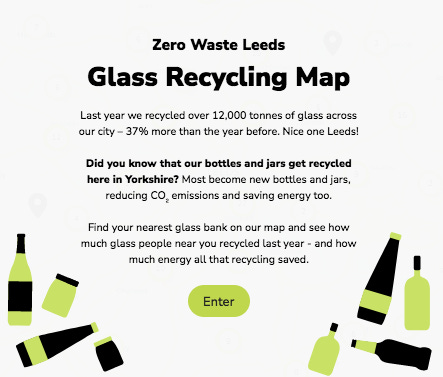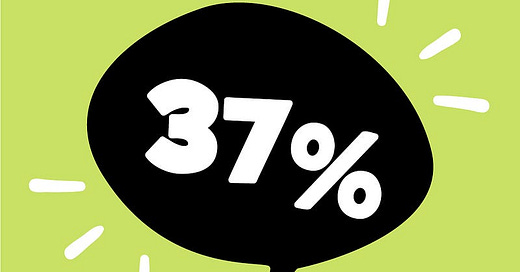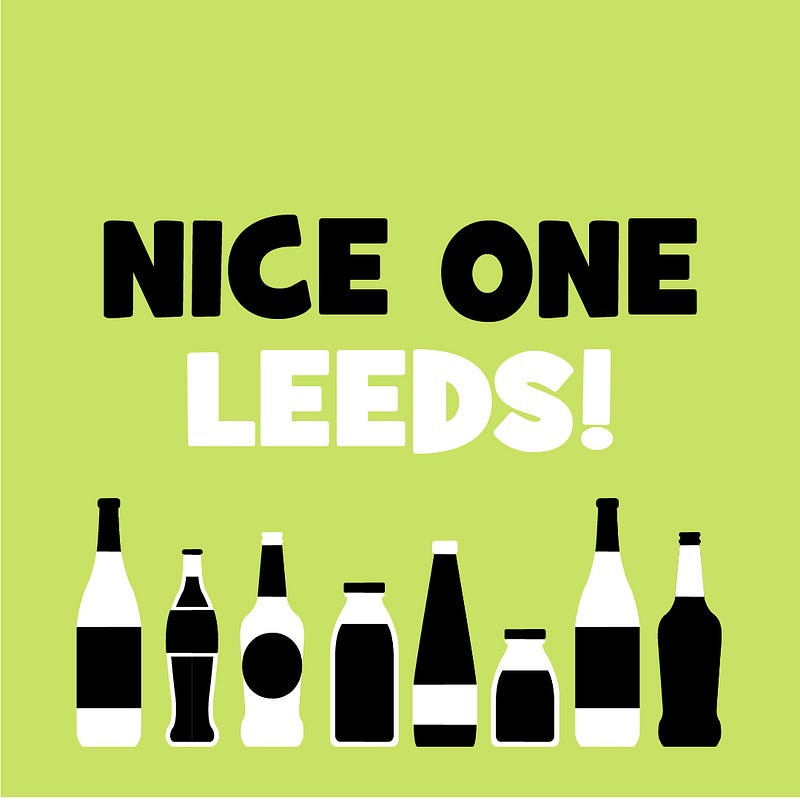Five takeaways from our glass recycling campaign
Five things we learnt from our successful glass recycling campaign in Leeds — about how to engage local people in environmental issues.
Zero Waste Leeds recently ran a glass recycling campaign, funded by British Glass, Allied Glass and Ardagh Group.
The idea for the campaign came from our analysis of glass recycling open data during the early months of COVID restrictions.
With pubs and restaurants closed, we were eating and drinking more at home — with a resultant increase in the amount of glass bottles and jars we were getting through.
And with our freedom to get out and about limited too, it seems that many of us chose to combine a daily walk with a trip to the local glass bank.
BBC Look North picked up on our research and ran a feature in summer 2020 on the increase in glass recycling by Leeds residents.
On the back of this, we spoke with industry body British Glass, and glass manufacturers Allied Glass and Ardagh Group, who both have glass manufacturing plants in Yorkshire.
They agreed to fund us to run a campaign in Leeds to encourage people to keep recycling their glass, which we ran during 2021.
First of all, we reviewed in detail the data on the amount of glass that has been recycled in Leeds since 2017. This granular data — on amounts collected at each of the glass banks in Leeds, every month — helped us to build up a detailed picture of glass recycling in our city.
We also used this data to create an interactive map — letting people know where their nearest bank is, how much glass has been recycled there in the past twelve months, alongside an estimate of the environmental impacts of all that recycling.

We also reviewed previous glass recycling campaigns, in Leeds and elsewhere, to understand what works when it comes to encouraging people to recycle more glass.
We then developed key messages for a three month social media campaign, whilst building up relationships with local community groups so we could run campaigns in three local communities — working with local young people to design new glass banks where they live.
The campaign was really well received, and you can read our detailed impact report here.
Here are our 5 takeaways from this campaign
1 - Do your research
Before developing the campaign itself, we undertook detailed analysis of the open data that Leeds City Council shares on recycling volumes at glass banks across the city.
This gave us a much more detailed understanding of glass recycling — helping us to understand where the sites are that account for the majority of glass recycled in Leeds (mainly supermarket car parks) and where there may be opportunities to increase the amount of glass recycled.
With a limited budget, we knew we couldn’t do primary research with residents ourselves — so we worked with a postgraduate student to do a detailed review of previous glass recycling campaigns — so we could learn about what works (and what doesn’t).
It is clear to us that the success of our campaign came in part from gathering insight in this way.
2 - Talk about the climate emergency in relatable ways
Over the last 18 months we have made a real effort to make the connection between waste reduction and the broader climate crisis.
And with an online community of over 25,000 social media followers, we know that we’re good at finding engaging ways to talk with people about these issues.
But it’s an ongoing challenge to work out how to communicate about the climate crisis in ways that don’t just turn people off.
So throughout this campaign, we tried hard to communicate the environmental impacts of glass recycling in ways that capture people’s attention.
We focused on telling the story of what happens to your glass when you recycle it, as this is a really good Yorkshire circular economy story — with much of the glass recycled in Leeds being made into new glass products.
People are proud of where they live — and they love to hear stories that celebrate good stuff happening where they are.
BBC Look North told this Yorkshire story in October 2021.
We also created a map, which as well as telling you where your nearest glass bank is, also highlights the environmental impacts of recycling glass.
3 - Find creative ways to involve local people
Online marketing can be a great way to reach high numbers of people, particularly with limited budgets.
But it’s important to understand how valuable it is to engage with people face to face, where they live.
We worked with community groups in three inner-city areas of Leeds, to involve local young people in the design of new glass banks in their communities.

This gave young people an opportunity to make a difference where they live, and it also gave us the chance to explore why recycling your glass is one of the practical things you can do in response to the climate crisis.
And by attending local community events to launch the new banks, we did all we could to create a buzz around the new banks. This undoubtedly contributed to the 43% increase in glass recycled across the three sites in the weeks after their launch.
4 - Transparency builds trust
This is a key one for us at Zero Waste Leeds.
We think the world of waste and recycling is often too opaque. Citizens are often sceptical about what happens to their recycling — and the waste industry often doesn’t help, at times sharing partial details on what happens next to the things we all recycle.
If we want citizens to take action — for example to make the effort to go to a glass bank to recycle bottles and jars — then we need to be transparent about why it’s worth it.
And the great news about glass recycling in Leeds is that there’s a really good story to tell — with much of the glass recycled here getting made into new glass bottles and jars — right here in Yorkshire.

We believe the success of our campaign — funded by the glass industry — points to how manufacturers, waste processors and recyclers can engage citizens in doing the right thing.
5 -Take the long view on behaviour change
This is a bit of a heartfelt plea. Informed by years of experience.
Change takes time. And we are confident that our campaign has made a real difference with regards to changing perceptions amongst people in Leeds around the value of glass recycling.
Just like our campaigns on food, clothing and all sorts of other issues make a difference.
But the challenge for us — and this point stands in a wider sense too — is that campaigns are often funded for short periods.
Change takes time. Embedding changes in behaviour takes time. Helping people to develop new habits takes time.
If, to respond to the climate emergency, we believe that change needs to happen fast, and at scale, then we need to invest for the long term.
We need to take the long view on how we engage citizens in making the changes that we need to make. And that includes investment in longer-term campaigns — to build upon the impact of short, high-impact campaigns like our glass recycling campaign.
Do you like the look of what we’ve done?
We are experts in finding creative ways to engage people in issues relating to waste reduction, the circular economy and the climate emergency. If you would like to explore how we could work with you to engage people where you are, please get in touch.







